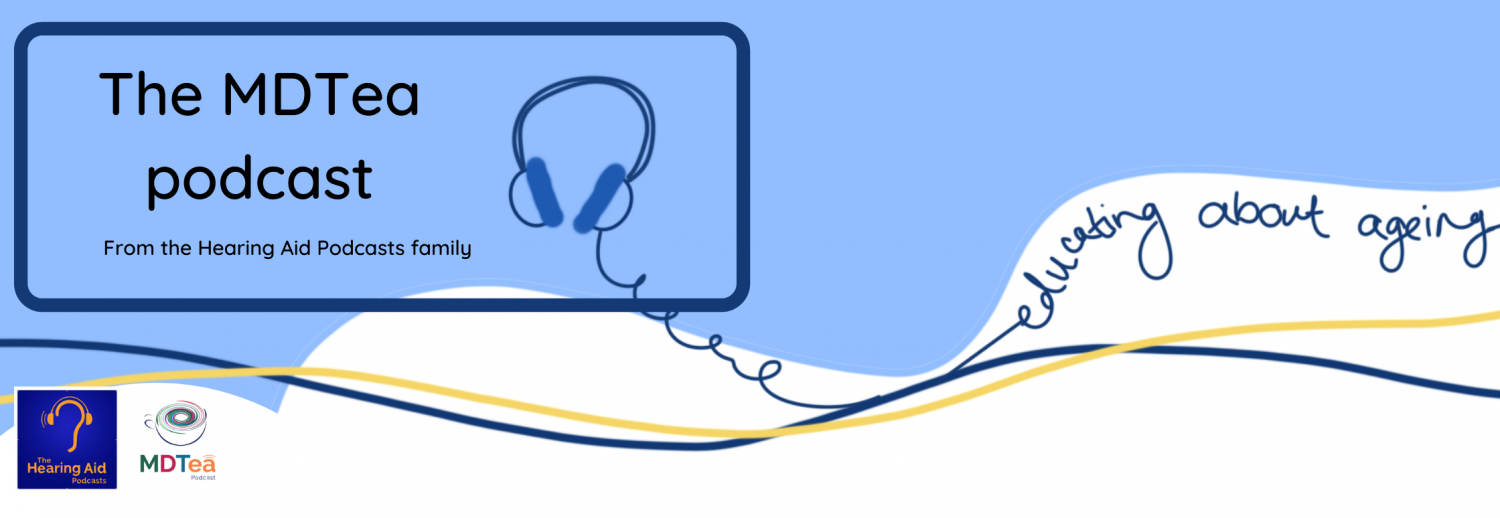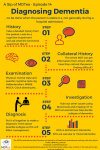Episode 2.4 – Diagnosing Dementia
MDTea Episode 2.4 – Diagnosing Dementia
Presented by: Jo Preston (Consultant Geriatrician at St George’s Hospital) and Iain Wilkinson (Consultant Geriatrician at East Surrey Hospital).
Core Faculty: Wendy Grosvenor – Nurse, Tracey Szekely – OT
In this episode we talk about making a diagnosis of dementia and when and how to do this.
Broadcast date: 4th October 2016
Here is a sip of this week’s MDTea
Downloadable show notes are here
CPD log
Click here to log your CPD online and receive a copy by email.
Show Notes – Episode 2.4 – Diagnosing Dementia
Learning Outcomes
Knowledge
- To understand what dementia is
- To understand the main differences between Alzheimer’s Disease, Vascular dementia, Lewy Body dementia and Fronto-temporal dementia
Skills
- To be able to take a history and collateral history of cognitive impairment
- To be able to complete the common diagnostic and screening tools in patients with possible cognitive impairment
- To know when to refer on for more detailed investigations / testing
Attitudes
- To appreciate the implications of a dementia diagnosis on patients and their relatives
What is dementia?
“A decline in memory, which is most evident in the learning of new information, although in more severe cases, the recall of previously learned information may be also affected. The impairment applies to both verbal and non-verbal material. The decline should be objectively verified by obtaining a reliable history from an informant, supplemented, if possible, by neuropsychological tests or quantified cognitive assessments.”
There is however often the question of what is normal brain ageing and what constitutes dementia – “Dementia is a progressive and largely irreversible clinical syndrome caused by pathological changes to the brain which are not simply due to ageing. It is not an inevitable part of the ageing process”. The key differnce betwen normal ageing and dementia is that dementia leads to a functional impairment for your patient.
When to make a diagnosis?
The general rule of thumb is not to make a diagnosis during an acute hospital stay – there are too many variables and delirium (see episode 2) is so common that it makes it hard to do. Although a recent study from Dr Jackson and collegues shows that it can be done if you interview the patients relatives using a standardised questionnaire.
One small study we talked about looked at OT assessment of patients functional abilities in the clinic vs at home and suggests that assessments should be performed in the patient’s usual environment as the impact of environment on the ability to perform ADLs is key.
How to make the diagnosis
1) You need to take a really detailed history:
- looking for cognitive decline
- AND functional problems resulting from this
- Iain recommends looking at the FAST staging to guide these questions:
- a review of medication in order to identify and minimise use of drugs, including over‑the‑counter products, that may adversely affect cognitive functioning.
2) Then an examination:
- cognitive and mental state examination (e.g. mood and delusions – i.e. another dysfunction of the brain / mind e.g. depression, anxiety, psychosis).
- Needs to look at a number of cognitive domains:
- attention and concentration (affected most in delirium),
- orientation,
- short and long‑term memory,
- praxis,
- language
- executive function
- Each of these can be affected in dementia – so the patient may present with a language problem or a praxis (e.g Posterior Cortical Atrophy)
- Needs to look at a number of cognitive domains:
- physical examination
- In some cases formal neuropsychological testing may be needed
3) Followed by investigations:
- A basic dementia screen include:
- routine bloods looking for reversible causes of cognitive impairment e.g. delirium, high calcium, low glucose, encephalopathy,
- thyroid function tests
- serum vitamin B12 and folate levels
- Imaging of the brain
- MRI better than CT
- Perfusion hexamethylpropyleneamine oxime (HMPAO) single‑photon emission computed tomography (SPECT) should be used to help differentiate Alzheimer’s disease, vascular dementia and frontotemporal dementia if the diagnosis is in doubt
- routine bloods looking for reversible causes of cognitive impairment e.g. delirium, high calcium, low glucose, encephalopathy,
Subtypes of dementia
The aim of the investigations is to diagnose a dementia and ideally the subtype as this may affect the kind of support the patient and their family will need and the treatments available.
-
- 60% of all dementia is Alzheimer’s dementia – Tending to present with short-term memory problem, visuo-spatial problems. It is steadily progressive but progression may be slowed by medications.
- Vascular and mixed dementia make up to 30% – there may have stepwise decline, often there are gait and balance problems. It is a a spectrum of disease and all vascular territories can be affected which leads onto a potential for a broad presentation.
- Lewy Body Dementia – is a mixture of cognitive decline with a movement disorder and psychosis (in particular hallucinations).
- Fronto-Temporal Dementia – may present to SaLT with speech problems. It is association with MND in younger adults. Tend to be quite mobile but with little insight and marked executive function problems i.e. planning (OT may pick up).
- Others – PD dementia / younger onset / CJD etc.
Cognitive screening tools
MMSE – Mental State Examination (MMSE)
- Score out of 23/30 as cut off
- takes 5-10mins to complete
MOCA – Montreal Cognitive assessment
- Score out of 30 – shorter form available.
- Free – online and versions for blind ppl etc. and give instructions and languages.
- For mild cognitive impairment
- Very detailed so can illustrate the areas of deficit well (OTs love it)
Addenbrooks
- Long but detailed and includes MMSE questions
- a shorter form is out now.
- Will help suggest a subtype.
There are several other shorter screening tools available e.g.
6 item – Cognitive Impairment Test (6‑CIT)
General Practitioner Assessment of Cognition (GPCOG)
Clock drawing (a number of ways of scoring this – but very quick to do).
Choice depends on practicalities of time available / job role.
Sheehan,B. Assessment scales in dementia Ther Adv Neurol Disord. 2012 Nov; 5(6): 349–358.
When performing an assessment think Talk briefly through MCI – is it early dementia? Is it normal ageing?
There is no functional deficit though with MCI.
May not cause a progression – may be part of ‘normal’ ageing for that patient- so retesting in the future is probably important.
We touch on the medication for the management of dementia but later on in this series we will talk about early interventions in dementia in more detail.
Curriculum Mapping:
This episode covers the following areas (n.b not all areas are covered in detail in this single episode):
| Curriculum | Area |
| NHS Knowledge Skills Framework | Suitable to support staff at the following levels:
|
| Foundation Curriculum 2012 | 7.2 History and examination
7.3 Diagnosis and clinical decision-making 7.9 Interface with different specialties and with other professionals 8.6 Manages acute mental disorder and self-harm 10.1 Manages patients with long-term conditions |
| Foundation Curriculum 2016 | 4. Self-directed learning
6. Interface with other healthcare professionals 10. Management of long term conditions in the acutely unwell patient 10. Support for patients with long term conditions |
| Core Medical Training | Common competences:
Symptom based competences:
System specific competences:
|
| GPVTS program | Section 3.05 – Managing older adults
|
| ANP (Draws from KSF) | Section 4. History taking skills
Section 6. Clinical examination Section 7.21 Dementia, depression, anxiety Section 10. CGA, Appropriate assessment scales Section 11. Plan diagnostic strategies |
| Physician Associate Matrix of conditions | Category 1B:
9.5 Dementias 9.5.1 Alzheimer’s Disease 9.6 Vascular diseases |
| College of Paramedics Curriculum Guidance | C2.3.8 Dementia, Alzheimer’s disease, Parkinson’s disease, palliative care and EoLC. |





